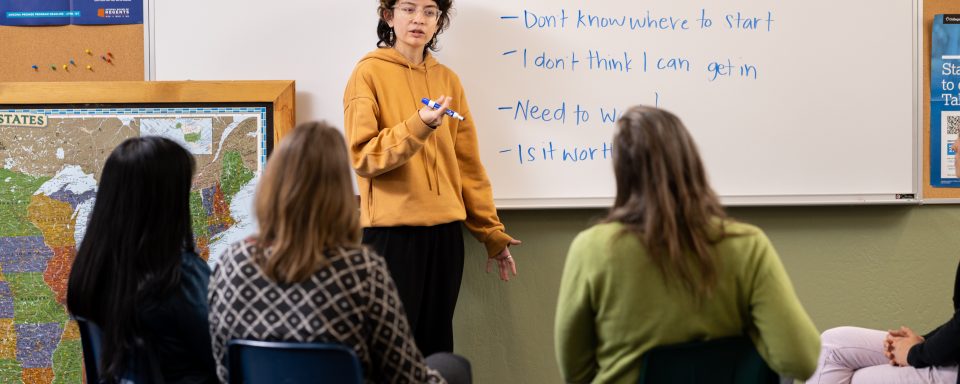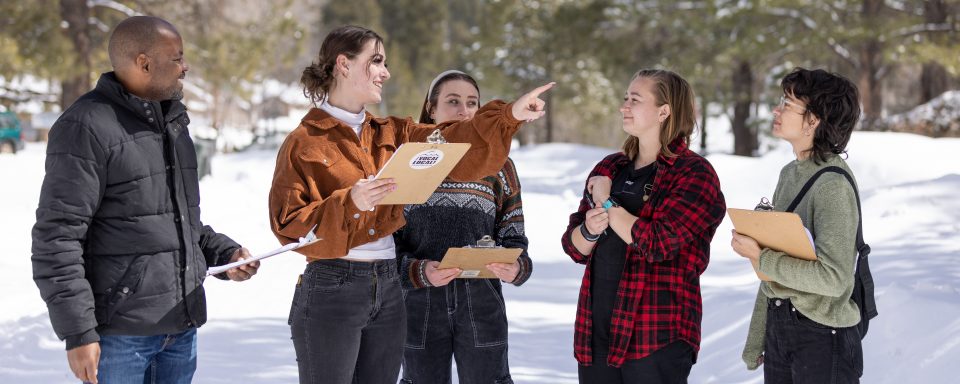Quick Facts
Student: Shelby Johnson
Major: Environmental and Sustainable Studies
OURCA-Affiliated Program: CUPIA Student’s Perspective: Research is Transformative, and Opens Doors
A CUPI Participant in a classroom outlining obstacles to higher education on a whiteboard, facing a panel of three women in front of them.
Interested in research or need an internship to graduate? Have you heard of CUPI? It is a collaborative research program at NAU that aims to give undergraduate students research experience and leadership skills through applied community inquiry while focusing on addressing various community partners’ identified research needs. Additionally, you can get academic credit for it!
To learn more about the program from a student perspective, read our interview with CUPI Participant Shelby Johnson.
Shelby: My name is Shelby Johnson, and I am an undergrad student in CUPI. I’m currently in the Climate Action Pod, and last semester I was in the Food Sovereignty Pod as well.
Mig: Thank you for being here Shelby. So, could you share a little bit already about the research process – like where you’re at in CUPI? You’ve bounced around the pods a little bit, but what was the process of getting into research like for you?
Shelby: I needed an undergrad, either internship or research for my degree – I’m an Environmental and Sustainable Studies Bachelor’s of Science major, and we’re required to have ENV 485. I reached out to my advisor, and she was like, “Oh, well here’s some options. CUPI is one that’s done through the school…” she explained it and I liked the way it sounded. I saw it as a way to get more involved with other students in the school that are outside of my degree. So I got signed up for it, and it was pretty easy to apply, a survey where you input “Oh, these are the pods that I’m interested in, this is why I’m interested in stuff.” But for the last two semesters, I’ve gotten into both the pods that I had as my number one choice.
Mig: Could you help describe the scope of your research in layman’s terms? What specifically does Climate Action entail?
Shelby: So, with CUPI, we work with community partners. Right now, we are working with the Flagstaff City Housing Office, and they have their 10 year housing plan that they released. We are conducting research on helping them incorporate more sustainable aspects into their housing plan. For example, my group is researching energy efficiency methods that could be incorporated into new builds and home remodels to help not only incorporate a more sustainable aspect into the homes, but also to save people money to where they’re not paying an arm in life for electric, kind of thing.
A group of CUPI students out in a snow covered forest, holding clipboards and smiling.
Mig: My next question is: how familiar were you with either or both fields (Food Sovereignty & Climate Action) prior to entering research through CUPI? Additionally, how has participating in these projects impacted your perceived career trajectory, or your personal trajectory?
Shelby: Before I went into it, I was not super familiar with how to fully conduct and lead research, so it has really expanded my skill sets in a lot of different ways from figuring out how to write a good research question to how to decide what types of methodology you want to conduct, how to collect the information, how you’re going to analyze the data.
As for the way it’s impacted my career trajectory, it’s definitely made me realize I want to get involved in more social sciences-based jobs. I want to help people. I want to get into a career where I can make a difference like the people we’re doing research for.
It’s a really great networking opportunity, I would say, as well, because I’m working with the housing office right now. They’re offering to help me figure out internship positions for my final semester and when I graduate. So it’s like building those connections with the community partners can also really help set you up for post graduation.
In terms of my personal trajectory, it made me realize I like people more than I thought I did. Because before I was like, I’d rather do my own thing, but it’s helped remove a lot of the social fear and social anxiety of talking to strangers and collecting information, sharing information, stuff like that.
Mig: Going from there, what would you say to students who are interested in research but are nervous or like might be, they think they might be interested in research, but they’re nervous to take that first step?
Shelby: Do it.
It’s terrifying at first. It sounds overwhelming. It sounds like there’s going to be so much to juggle. But if it’s something you care about, and the fact that you can alter your research to something you care about, it doesn’t feel like it’s homework and assigned work. It feels like, “Okay, let me further this on my education. Let me explore this more and stuff like that.
It’s the biggest thing I would say to people, especially if they’re considering something like CUPI or doing undergrad research for their degree: you are going to learn things you never thought you would learn and you’re going to gain new skill sets and experiences you wouldn’t have expected. And if you apply yourself, you’re going to be getting the most out of it. Passing the class is easy, but if you really give it your all you will get the most out of it.
Mig: That was our last formal question. So, with everything said, is there anything else that you would like to share with our audience?
Shelby: There are so many different pods that you can go and see for CUPI. I think right now we have over six different pods and many are designed to meet different majors interests. So it doesn’t matter necessarily what college you’re in, what program you’re in, anything like that. Give it a look, see if it has something you’re interested in because it’s an easy three credits and you get so much out of it. like I would always recommend it. I’m always surprised there’s not more people in the program.
This interview has been edited lightly for clarity.
Published 29 November, 2023.